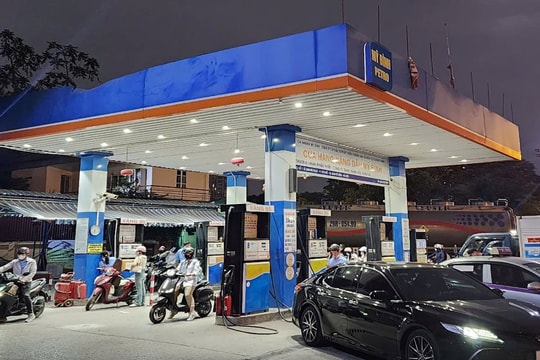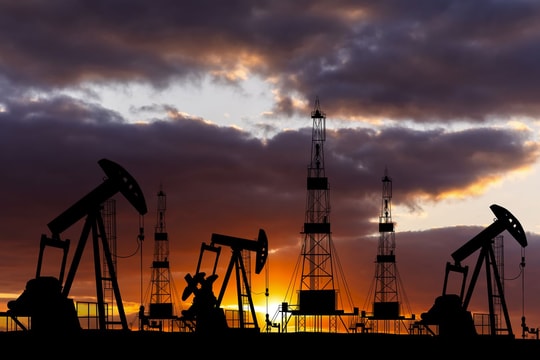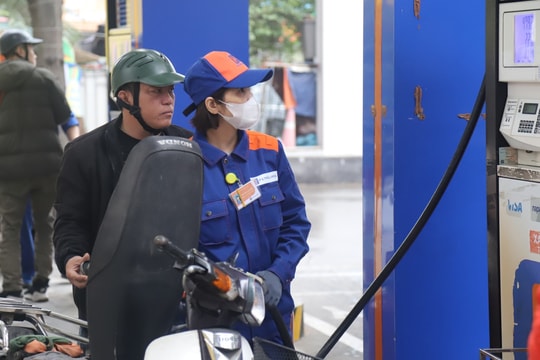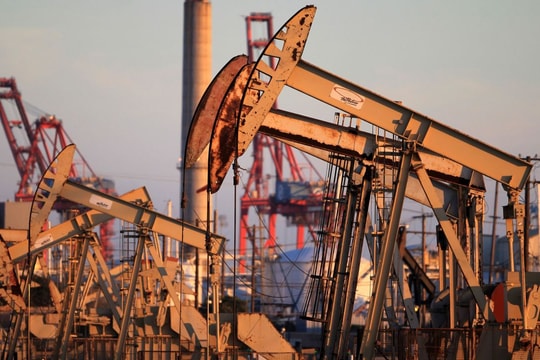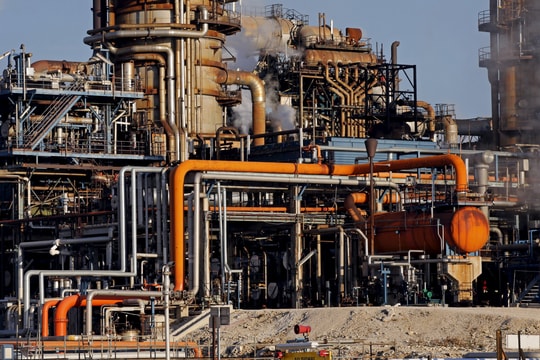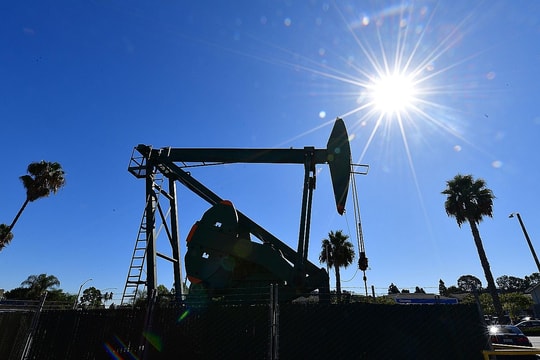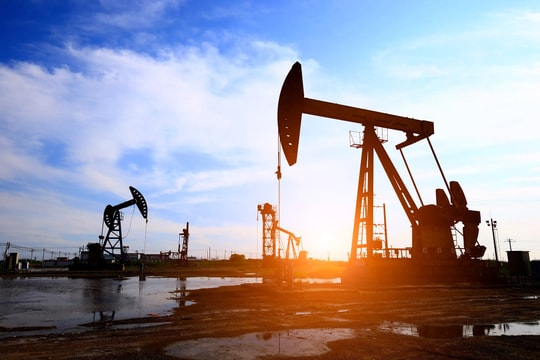How countries control gasoline and oil prices
Gasoline and oil prices have continuously reached new peaks, forcing many countries to find ways to slow down the increase by reducing taxes or releasing reserves.
Gasoline and oil prices have continuously reached new peaks, forcing many countries to find ways to slow down the increase by reducing taxes or releasing reserves.
The war in Ukraine and its ripple effects have caused world oil prices to skyrocket in recent times, forcing many governments around the world to provide support to ease the financial burden on their people. On May 30, Brent crude oil prices rose above $120 a barrel after the European Union (EU) announced a ban on 90% of Russian oil imports.
Average gasoline price atAmericaGas prices hit a record high of $4.62 a gallon on May 31, up 52% from a year ago. People in seven states are paying at least $5 a gallon. Prices in California are even higher than $6. Inflationary pressures could squeeze spending very quickly and slow U.S. growth.
"Gasoline prices often have a big impact on consumer sentiment and are considered a barometer of future inflation," Jeffrey Roach, an economist at LPL Financial, told the Washington Post, adding, "Especially during the reopening period, when demand for travel is expected to spike, gasoline prices will affect driving plans. Oil prices, in general, will affect airline tickets."
US President Joe Biden has repeatedly stated that he will find every way to reduce gasoline prices. The country has released its national oil reserves, found new sources of supply... but gasoline prices have not been able to cool down. In a post in the Wall Street Journal on May 31, Mr. Biden wrote that the administration needs to minimize the impact of rising gasoline prices, while urging the US Congress to accept his proposals for tax cuts and clean energy investments.
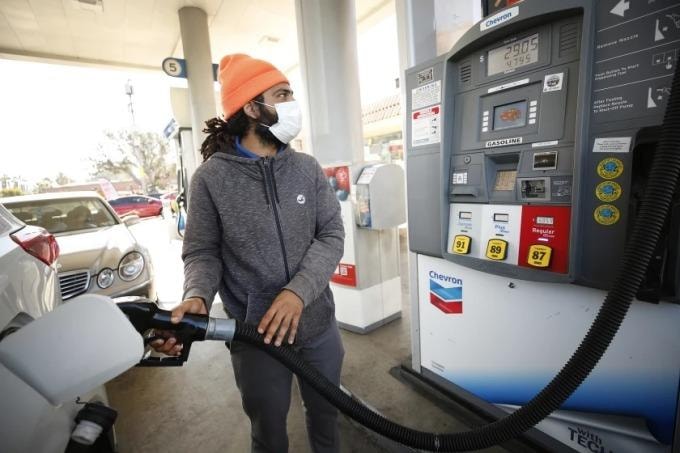 |
An American is pumping gas in Los Angeles. Photo:Los Angeles Times |
InKorea, gasoline prices on May 30 rose to 2,012 won (1.6 USD) per liter, approaching the historical peak in 2011. In Seoul, gasoline prices were 2,088 won per liter, and diesel was 2,066 won.
Fuel taxes in South Korea were cut by 30% from May 1, instead of the planned 20%. Previously, the country only planned to reduce taxes on gasoline, diesel, and liquefied petroleum gas (LPG) for 6 months, until the end of April. But then they had to extend it for 3 months, until the end of July. The country also left open the possibility of increasing the tax reduction if prices continue to rise.
With diesel prices surpassing 2,000 won a liter for the first time, the South Korean government announced earlier this month a support plan for those hit by rising living costs due to high fuel prices.
GovernmentSouth AfricaOn May 31, the government also announced a series of measures to slow the sharp rise in domestic fuel prices. It extended the current reduction in fuel tax of 1.5 rand ($0.10) per liter until early July, which was announced in March. The extension will cost South Africa 4.5 billion rand ($288 million) in lost revenue.
From June, the country's Ministry of Energy will also scrap an administration levy currently set at 0.1 rand per litre, which applies to 95 petrol. It is also proposing to cut the price of base fuel by another 0.03 rand per litre in the coming months.
Even with the new measures, South Africa said petrol prices would rise by 2.4 rand a litre from June, while diesel prices would rise by 1.1 rand. Fuel prices in the country are adjusted monthly, according to global oil prices and the rand exchange rate.
InThailandIn mid-May, Prime Minister Prayut Chan-o-cha announced an extension of the excise tax reduction on diesel for another two months, while also increasing the reduction. He said that from May 21 to July 20, the excise tax on B5 diesel will be reduced by 5 baht per liter, up from the previous rate of 3 baht. The previous tax rate was 5.99 baht per liter.
This will cause the Thai budget to lose about 20 billion baht. The country's Petroleum Fund will also lose about 70 billion baht.
"It is necessary to care for the people and manufacturing enterprises. The government is doing its best to prevent the retail price of diesel from increasing sharply like the world crude oil price. Otherwise, this will affect the cost of living, consumer prices and transportation," he said.
He also said the Thai government was considering support for the hardest-hit fuel users. The price of standard diesel in Thailand was nearly 32 baht a liter in the middle of last month.
Tax reduction is also the way many states inCanadaoptions to hold down fuel prices. In April, the Ontario government announced plans to reduce the gasoline tax by more than 5 cents a litre in the second half of the year. In March, the Alberta government announced that it would not collect the fuel tax (currently at 13 cents a litre) if WTI crude oil prices remained above $90. The average price of gasoline in Canada hit $2 a litre for the first time in mid-last month.
Still atNetherlandsFrom April, fuel taxes will be reduced by 17 cents a liter for gasoline and 11 cents a liter for diesel. VAT on energy will also be reduced from 21% to 9%, starting from July. In total, the package will cost the Dutch finance ministry 2.8 billion euros and will be in place for at least six months. In this country, taxes account for 50% of the price of gasoline and 40% of the price of diesel.
The one-off payment for low-income families has also increased from 200 euros to 800 euros. "Dutch people are getting poorer because the things we buy are more expensive," said Karien Van Gennip, the Dutch minister for employment and social affairs. "We can't compensate everyone, so we're focusing on low- and middle-income families."

